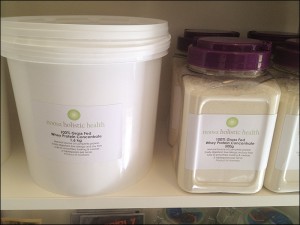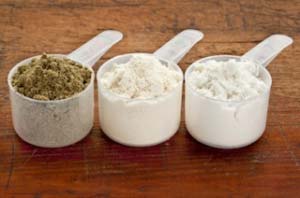In regularly assessing my patients’ diets and daily requirements for optimal health it has become very evident that many are far too busy to manage a healthy balanced diet. A diet insufficient in protein can lead to low energy, poor concentration, slow healing, impaired immune function and poor development. An increasingly popular way of increasing our protein intake and a very easy addition to our diet is the use of protein powders.
 A constantly growing number of studies support both existing and emerging applications for whey protein. The biological components of whey demonstrate a range of immune-enhancing, antiviral and antibacterial properties. In addition, whey has the ability to act as an intracellular antioxidant, hypotensive, hypolipidaemic, and chelating agent, i.e. assisting with blood pressure, cholesterol, and the removal of toxins and heavy metals. Whey is also commonly used in weight management and to enhance performance in athletes.
A constantly growing number of studies support both existing and emerging applications for whey protein. The biological components of whey demonstrate a range of immune-enhancing, antiviral and antibacterial properties. In addition, whey has the ability to act as an intracellular antioxidant, hypotensive, hypolipidaemic, and chelating agent, i.e. assisting with blood pressure, cholesterol, and the removal of toxins and heavy metals. Whey is also commonly used in weight management and to enhance performance in athletes.
Protein powders are often seen to be something that is used by weight lifters and people trying to improve muscle mass and growth, under guidance they are also used effectively in low carbohydrate high protein diets to assist in weight loss.
Whey:
Contains a full spectrum of amino acids as well as branch chain amino acids which are readily digested and a large proportion are utilised by the body for tissue recovery and skeletal growth. Hence Whey powder has a greater biological value (BV) than lean red meats, fish, chicken and whole eggs. Meaning it is more readily absorbed and utilised by the body than other protein sources.
A balanced diet however should contain protein from a variety of sources, such as legumes, pulses, meats, fish, eggs, nuts etc. Dietary supplements such as Whey protein powders serve to assist us where our diets are lacking or when we need a greater level of protein intake to meet our bodies need for recovery or development.
Through the filtration process most of the fat and lactose is removed from the whey resulting in a more concentrated protein source.
There is some confusion over the benefits and differences of whey concentrate and isolate. What are they and which should you take?
Here’s a breakdown of some of the more obvious differences and benefits:
Concentrate:
Whey concentrate contains growth factors that are not normally found in whey isolate and also contains much higher levels of nutrients and phospholipids, of which some are bio-active and include Conjugated Linoleic Acid (CLA). Whey concentrate contains approximately 80-85% protein after the initial filtration process, where as whey isolate contains up to 90-94% protein. This makes the Isolate a better source of protein and more suitable for those with an intolerance to lactose as most of the lactose is filtered out through the second filtration process used to make the whey isolate.
Isolate:
Undergoes a more vigorous filtration
 process and more commonly then not an ion exchange process is used to make whey isolate and it is this process that denatures the protein structure and damages nutrients. This is the main reason I prefer Whey concentrate over isolate.
process and more commonly then not an ion exchange process is used to make whey isolate and it is this process that denatures the protein structure and damages nutrients. This is the main reason I prefer Whey concentrate over isolate.
However this leaves isolates with a higher level of protein (approximately 90% versus 80% in concentrate) and a more rapid absorption rate then concentrates. This creates a more profound insulin response making whey isolates popular post-workout. Whether this increased rate of absorption translates into any real anabolic advantage is arguable, but anyone wishing to limit rises in insulin may want to avoid isolates because of their effects on insulin release. Whey isolate is also considered to have lower levels of fat, cholesterol, lactose, carbohydrates and calories. Although whey protein concentrate is already considered low in lactose, whey protein isolate is considered even lower because of the additional manufacturing processes. The further processing make isolates a more expensive option compared to whey, but with lower lactose it should be considered for athletes and people with a lactose intolerance or sensitivity.
So in weighing up the benefits and differences. If the higher price tag is swallowable and muscle gain and management is urgent then isolate may be your protein. Whey concentrates are a safer and more stable product, easily absorbed and broken down to offer a more sustained supply of energy tissue repair.
Recently a number of clinical trials have successfully been performed using whey in the treatment of cancer, HIV, hepatitis B, cardiovascular disease, osteoporosis, and as an antimicrobial agent. Other research in elderly patients demonstrates that consumption of whey protein improves skeletal muscle growth and protein accrual attributed to more then just the essential amino acid constituents of the whey. These findings show the ability of whey to protect and support healthy muscle tissue in the elderly and prevent muscle wastage.
One of the main effects of whey protein lies in its ability to increase glutathione (GSH) levels. GSH, a tri-peptide made up of the amino acids cysteine, glutamine, and glycine is an essential antioxidant and cofactor for our cellular health and immune system. GSH levels are a highly sensitive indicator of our cell function, health and viability. If GSH is dramatically reduced it leads to cell death and is linked to a number of diseased states.
As a dietary supplement or support for a busy lifestyle and the demands we place on ourselves, and our bodies protein levels are essential to be aware of and maintain.
Byron Hillier
Acupuncture – Chinese Herbs – Massage – Qi Gong – Yoga




Leave A Comment